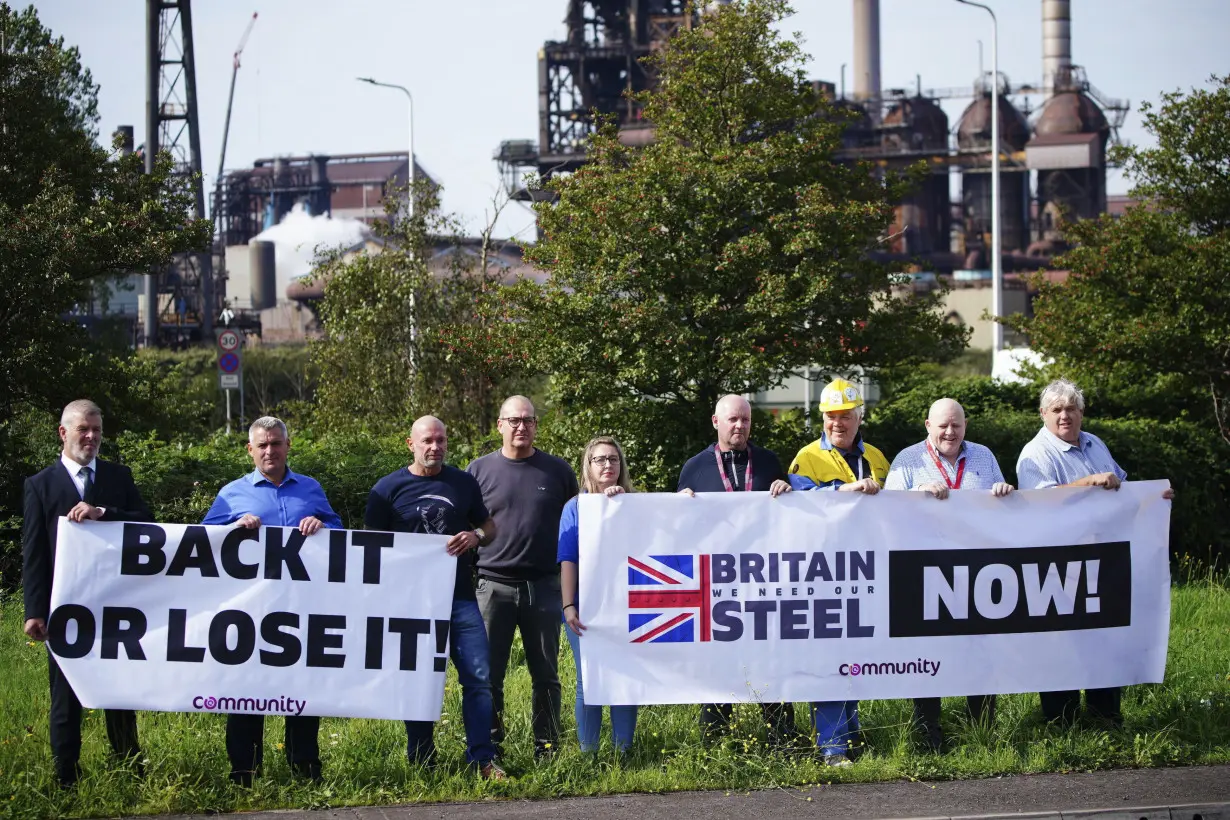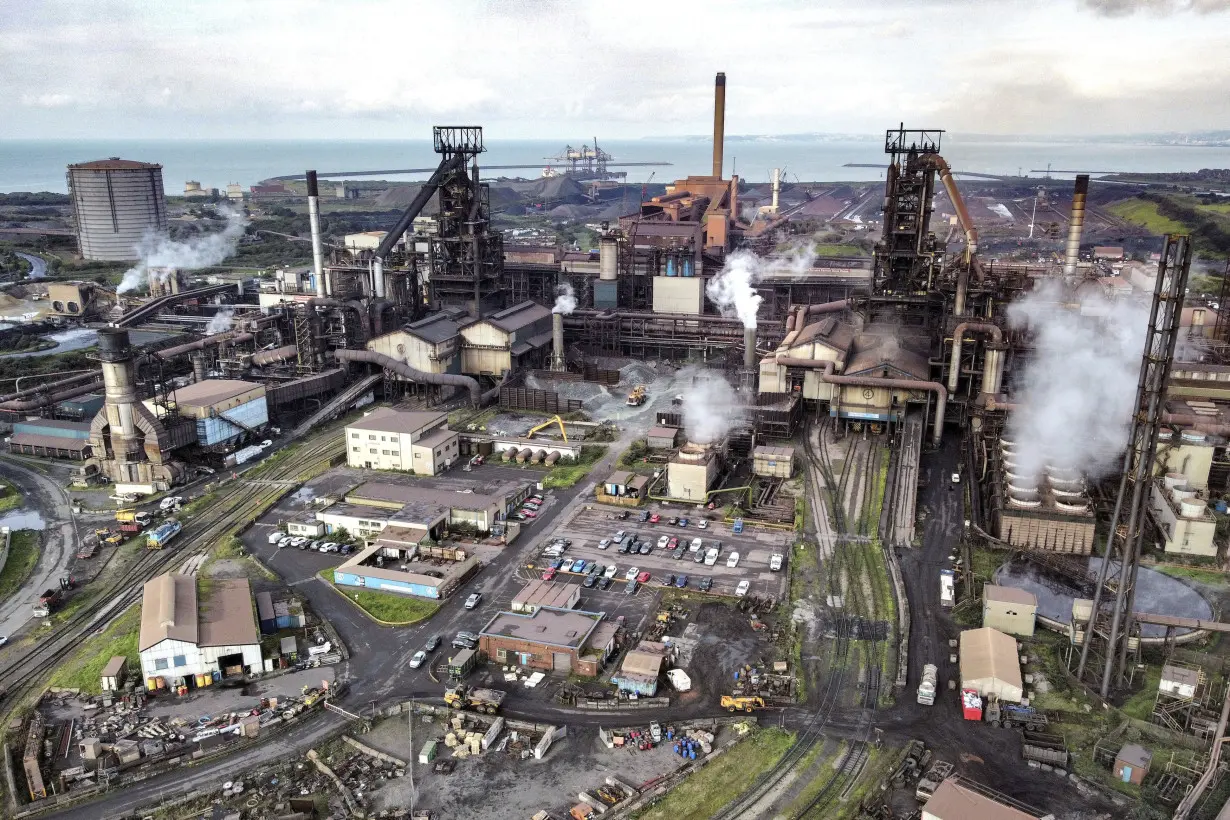LONDON (AP) — Around 3,000 workers at Britain's biggest steelworks face the prospect of losing their jobs as part of a government-backed package Friday to make the plant “greener.”
The British government confirmed widespread speculation that it will pump up to 500 million pounds ($620 million) into the loss-making Port Talbot steelworks in south Wales, money it says will safeguard the future of a site that has been making steel since the early 1900s.
“This proposal is a landmark moment for maintaining ongoing U.K. steel production, supporting sustainable economic growth, cutting emissions and creating green jobs,” said Treasury chief Jeremy Hunt.
Tata, the Indian conglomerate that owns the steelworks, will use the government subsidy to help switch the plant’s two coal-fired blast furnaces to electric arc versions that can run on zero-carbon electricity.

Tata, which employs around 8,000 people across the U.K., will also invest around 750 million pounds into the project, but cautioned that the plans will lead to consultations over a “deep potential restructuring” — code for job losses.
In a separate statement Friday, Britain’s Department for Business and Trade said the deal will only safeguard around 5,000 jobs out of Tata’s total workforce.
Tata said the deal lays out a future for sustainable steel-making in the area and committed to undertake a “meaningful" consultation with unions.
“With the support of the U.K. government and dedicated efforts of the employees of Tata Steel U.K. along with all stakeholders, we will work to transform Tata Steel UK into a green, modern, future-ready business," said Tata Steel’s chief executive and managing director, TV Narendran.
The deal comes two months after Tata confirmed plans to build a 4 billion-pound battery factory in the U.K. after also getting subsidies from the government.
Unions were furious about the potential job losses at Port Talbot, which at its height in the 1960s employed around 20,000 people, before cheaper offerings from around the world hit production.
"The cost to local people and the wider Port Talbot community will be immense," said Gary Smith, general secretary of the GMB trade union. “Once again, we have the spectacle of leaders talking up the fantasy land of a ‘just transition’ while the bitter reality for workers is them getting the sack.”
The 1.25 billion-pound furnaces are expected to be up and running within three years of getting regulatory and planning approvals.
Tata warned last year that its U.K. operations were under threat unless it secured government funding to help it move to less carbon-intensive electric arc furnaces.
Luke Murphy, head of the fair transition unit at the Institute for Public Policy Research think tank, said the government had “ignored or abandoned” the interests of unions and workers.
“The use of coal in steelmaking must come to an end but this looks like a bad deal for workers, the wider community in Port Talbot, and for Britain,” he said.
He noted that Germany has invested over $53 billion in decarbonising heavy industry and has committed to work with unions and protect jobs.
“The U.K. has nothing like the scale of this commitment and has done nothing to make conditions more favourable for investment," he added.

 TikTok seeks to reassure U.S. employees ahead of Jan. 19 ban deadline
TikTok seeks to reassure U.S. employees ahead of Jan. 19 ban deadline
 US won't seek charges in unarmed Black motorist Ronald Greene's fatal 2019 arrest
US won't seek charges in unarmed Black motorist Ronald Greene's fatal 2019 arrest
 Euro zone households could increase consumption, ECB chief economist says
Euro zone households could increase consumption, ECB chief economist says
 Foreigners sold South Korean equities last month by most since early 2020
Foreigners sold South Korean equities last month by most since early 2020
 Trump and Biden national and homeland security staff will meet Wednesday for threat exercises
Trump and Biden national and homeland security staff will meet Wednesday for threat exercises
 As fires ravage Los Angeles, Tiger Woods isn't sure what will happen with Riviera tournament
As fires ravage Los Angeles, Tiger Woods isn't sure what will happen with Riviera tournament
 Antetokounmpo gets 50th career triple-double as Bucks win 130-115 to end Kings' 7-game win streak
Antetokounmpo gets 50th career triple-double as Bucks win 130-115 to end Kings' 7-game win streak
 No 97 Laura Siegemund upsets Olympic champion Zheng Qinwen at the Australian Open
No 97 Laura Siegemund upsets Olympic champion Zheng Qinwen at the Australian Open








